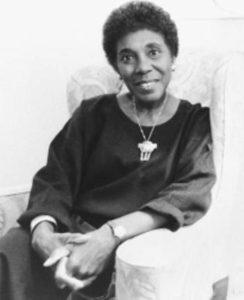
Paule Marshall
*Paule Marshall was born on this date in 1929. She was a Black poet, prose writer, and professor.
She was born Valenza Pauline Burke in Brooklyn, New York, to Adriana Viola Clement Burke and Sam Burke. Marshall's father had migrated from Barbados to New York in 1919 and, during her childhood, deserted the family to join a quasi-religious cult, leaving his wife to raise their children by herself.
Marshall wrote about how her career was inspired by observing her mother's relationship with language: "It served as therapy, the cheapest kind available to my mother and her friends. It restored them to a sense of themselves and reaffirmed their self-worth. Through language, they were able to overcome the humiliations of the workday. Confronted by a world they could not encompass, they took refuge in language." Infatuated with the poet Paul Laurence Dunbar, Marshall changed her name from Pauline to Paule (with a silent e) when she was 12 or 13.
She attended Bushwick High School and subsequently enrolled in Hunter College, City University of New York, with plans to become a social worker. Marshall took ill during college and took a year off. During that time, she decided to major in English Literature, eventually earning her Bachelor of Arts degree at Brooklyn College in 1953 and her master's degree at Hunter College in 1955.
After graduating college, Marshall wrote for Our World, the acclaimed nationally distributed magazine edited for African American readers. She taught her discipline in writing and eventually aided her in writing her first novel, Brown Girl, Brownstones. In 1950, Marshall married psychologist Kenneth Marshall; they divorced in 1963. In the 1970s, she married Nourry Menard, a Haitian businessman.
Early in her career, she wrote poetry but later returned to prose, and her debut novel, Brown Girl, Brownstones, was published in 1959. Brown Girl, Brownstones tells the story of Selina Boyce, a girl growing up in a small black immigrant community. She received a Guggenheim Fellowship in 1961 and, in the same year, published Soul Clap Hands and Sing, a collection of four novellas that won her the National Institute of Arts Award.
In 1965, she and Langston Hughes accompanied a State Department-sponsored world tour, on which they both read their work, which was a boon to her career. She published the novels The Chosen Place and the Timeless People (1969), which the New York Times Book Review called "one of the four or five most impressive novels ever written by a black American," and Praisesong for the Widow (1983), the latter winning the Before Columbus Foundation American Book Award in 1984.
She taught at Virginia Commonwealth University, the University of California, Berkeley, the Iowa Writers' Workshop, and Yale University before holding the Helen Gould Sheppard Chair of Literature and Culture at New York University. In 1993, she received an honorary LHD from Bates College. She lived in Richmond, Virginia. She was a MacArthur Fellow and a winner of the Dos Passos Prize for Literature. In 1994, the New York Public Library designated her a Literary Lion.
Marshall was inducted into the Celebrity Path at the Brooklyn Botanic Garden in 2001. Her memoir, Triangular Road, was published in 2009. 2010, she won a Lifetime Achievement Award from the Anisfield-Wolf Book Awards. Paule Marshall died in Richmond, Virginia, on August 12, 2019, having had dementia in her later years. A biography by Mary Helen Washington, published by Yale University Press, is in preparation.